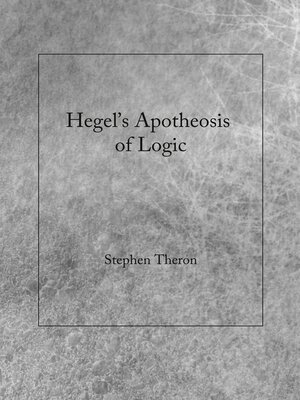
Sign up to save your library
With an OverDrive account, you can save your favorite libraries for at-a-glance information about availability. Find out more about OverDrive accounts.
Find this title in Libby, the library reading app by OverDrive.



Search for a digital library with this title
Title found at these libraries:
| Loading... |
This book presents what Hegel calls "the vital spirit of the actual world", the truth, namely, of logic's form and content as one concrete whole. Axiomatic here is that thinking is necessarily free and unbounded, if we could escape a performative contradiction in evaluating it. Thinking is absolute, what Hegel calls spirit or mind, Geist. He identifies three forms of "absolute spirit", namely art, religion and philosophy, where each form is absorbed into the next one; philosophy subsumes religion and religion subsumes art, in a process seeking and achieving the absolute. Philosophy, therefore, is ultimately theology as fulfilling the latter in mind's constitutive self-transcendence towards "the absolute idea", itself the absolute, Hegel asserts. This is "absolute idealism", where the Idea is true being and finite things are transitory notions. This book aims to clarify such conceptions, whereby "theological" transcendent grace is natural or "all in all", faith is absolute knowledge in germ, things are the opposite of what they "immediately" seem, while achieved self-consciousness is "the ruin of the individual" abstractly parted from its objects. Thus external nature is internal, the whole in or one with the part, necessity absolute freedom, these being stages of Logic. Hegel needs a second, related trio to the above three forms. This is logic, nature and mind, likewise, in ceaseless process, a returning upon self. Thus art's foundational quality mirrors that of "the logical art". The individual art-object, art as striving for absolute perfection, founds spirit's trajectory. Hence, consciousness first appears individual only as set towards universal self-consciousness in "absolute knowing".






